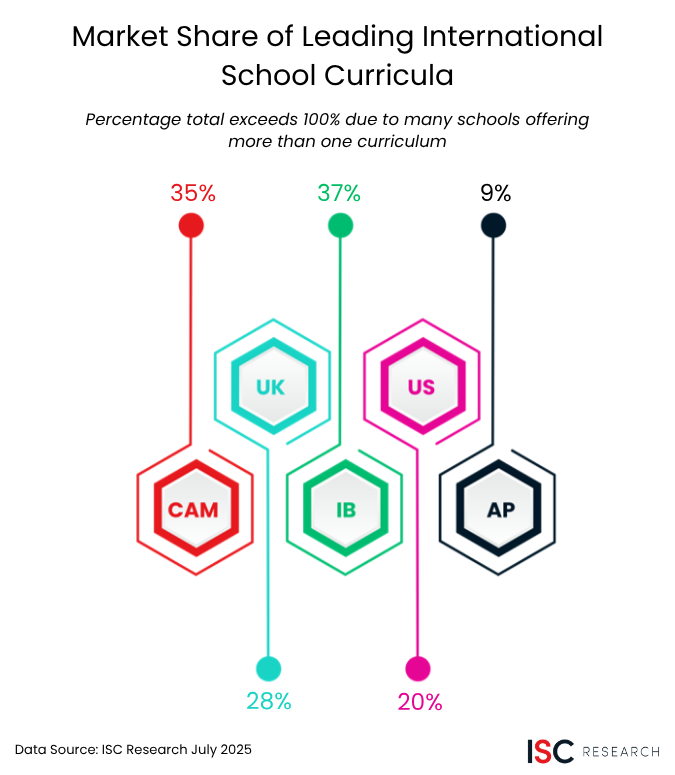An unexpected contrast defines the state of global education today. As scepticism over the value of higher education grows, evidenced by top global firms such as Google, Apple, IBM, Netflix, and Accenture removing degree requirements for many roles, ISC Research data shows a 45% increase in international school numbers over the past decade, reflecting sustained demand for K–12 international education.
Despite these diverging narratives, global demand for higher education persists. International schools, renowned for their clear pathways to university, represent a largely untapped source of globally minded and academically aspirational students. However, as students and their families increasingly look beyond traditional university destinations that have long dominated the market, the higher education sector is faced with new challenges and opportunities.
The Higher Education Pipeline
According to ISC Research data, over 7.7 million students are currently enrolled at international schools worldwide. Our interviews with school leaders reveal a defining shift in 2025: the growing prevalence of local enrolments. In many countries, local families are seeking globally recognised qualifications as a pathway to higher education and professional success. This reflects the reputation and transferability of international school curricula, with the following five programmes dominating the K-12 market due to their rigorous standards and clear university progression routes.

The flexibility of academic pathways is another key differentiator for international schools. In China, India, and UAE, multiple-track models allow students to combine national and international qualifications, creating routes to both global and domestic universities. In many cases, this adaptability mirrors shifting student aspirations. As universities across Asia climb global rankings and streamline international admissions, international schools are adapting their academic pathways accordingly.
To remain competitive, universities need to anticipate these shifts, identify growth opportunities, and connect with schools whose students align with their recruitment goals. Learn more about how ISC Research provides the data and in-region expertise to support you here.
Shifting Demographics and Aspirations
Our conversations with international school counsellors reveal that international schools are becoming an increasingly important source of future undergraduate students, even as the geography of university demand rapidly evolves. Traditional destinations, notably the US and UK, have faced pressures on international enrolments. In the US, tougher visa rules have contributed to a sudden decline in international student numbers on university campuses, according to CNBC. Meanwhile, the UK has seen a modest rebound from previous declines, with sponsored study visa applications rising 7% between January and August 2025 compared with the same period last year. Progress remains slow, however, as the BBC reports a growing number of English universities operating in financial deficit.
Asian universities have responded with agility. Osaka University in Japan is offering tuition waivers and research grants to students affected by recent US policy changes, while Hong Kong’s Education Bureau has called on local universities to recruit top international talent. Similar patterns are emerging in Europe: the Netherlands, Spain, and Germany are attracting record numbers of international students through English-taught programmes and accessible tuition.
These shifts signal a new higher education landscape: one that is multipolar, with opportunities dispersed across regions. For universities, this means that traditional recruitment strategies may no longer suffice. Proactive engagement with emerging markets is now critical for diversifying student intake and building sustainable recruitment pipelines.
Diversify with confidence: use ISC Research intelligence reports to guide your strategy into new high-potential markets and connect with the right international schools.
International School Alignment
For universities navigating this transition, much lies beyond their control: visa policy changes and geopolitical tensions impacting international student enrolments. Nonetheless, one opportunity remains fully in reach: to align more closely with the values and educational priorities of international schools.
A defining feature of international education is its emphasis on global competencies – sustainability, technological fluency, intercultural understanding, and social responsibility. These priorities are embedded in leading international curricula: Cambridge, for example, launched the ‘Cambridge learner attributes’ to promote students’ confidence, responsibility, and reflection, while the International Baccalaureate emphasises critical thinking and cultural awareness through its learner profile. Many schools also complement this with experiential programmes, such as The Global College’s ‘Entrepreneurship Project’ and Hochalpines Institut Ftan AG’s ‘Ignite’ outdoor education, which support the development of practical skills and a global mindset.
Universities that combine academic rigour with real-world impact, while fostering strong school partnerships, are best positioned for success. A leading example is Esade, offering innovative degree programmes in topics such as Global Governance and Artificial Intelligence for Business. Esade collaborates directly with school counsellors in more than 100 countries, maintaining active engagement through events, student tracking, and joint initiatives. The institution has also developed dedicated scholarship schemes covering 100% of tuition and accommodation costs for selected international school graduates.
Esade attributes much of its rapid international growth to ISC Outreach, our online data portal that gives universities a unique opportunity to search, filter, and connect with over 15,000 English-medium international schools. The portal enables institutions to replicate Esade’s success: identifying tailored markets, engaging directly with school decision-makers, and turning data-led insights into actionable strategies for student recruitment.
“Thanks to ISC Outreach we have access to resources, news, contacts and information that is up-to-date about anything related to international schools. It is a complete source of data and information.”
Albert Diaz, Director Undergraduate Degree Admissions at Esade
The Future of Higher Education
The higher education sector is at an inflection point. Global demand persists, but its direction, and the expectations attached to it, are changing fast. As families seek value, relevance, and alignment with their global outlook, international schools represent a largely untapped opportunity for universities to diversify and strengthen their recruitment pipelines.
By proactively engaging with these schools, universities can turn this potential into a strategic partnership grounded in shared educational values, preparing students to thrive in an interconnected, fast-changing professional world.
ISC Research can connect you with well-prepared students from the right international schools – speak to our team to learn more.



